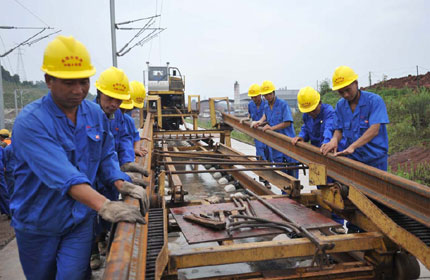Learning the lessons of history
Updated: 2014-07-04 08:44
By He Na (China Daily)
|
|||||||||||
 |
| At the launch of the book Tie Zheng Ru Shan, meaning ironclad evidence, published by the Jilin Provincial Archives, which records crimes committed by the Japanese. PROVIDED TO CHINA DAILY |
Biological tests
|
Downbeat, but determined The file room on the 11th floor of the Jilin Provincial Archives in Changchun is one of the most important in the building. The room — which is kept at a constant temperature of 14C to 24C and with humidity stabilized at between 45 percent to 60 percent — contains nearly 100,000 hand-written files relating to Japan’s invasion of China before and during World War II. The importance of the files means Chen Jiarong, the director of the room and a veteran at the archives, dare not relax. "These files are the most precious and important in our archive. As the translation and research work continues, more information will emerge gradually,” she said, noting that the files relating to the “Monthly Postal Review” have attracted attention in historical and archival circles across China. However, the success enjoyed by Chen’s team has been hard won. “It’s not an easy task to select and translate documents from 100,000 files, and many of my colleagues are overloaded with work,” said researcher Zhao Yujie. "The biggest concern isn’t the huge workload, though, it’s the psychological pressure of sifting through page after page of distressing details. These documents are so real and cruel. We have to read large numbers of files day after day, over and over. The material has caused an atmosphere of despair almost, and many of my colleagues are now deeply depressed,” she said. As one of the lead researchers into the files containing material about experiments conducted by Unit 731, the biological warfare corps, Zhao is feeling the pressure, too: “I have a recurring nightmare that I’ve been arrested by the Japanese and am being subjected to all kinds of torture. It’s tough sometimes, but none of us wants to give up our work as archivists because we are determined to uncover the truth.” — HE NA AND HAN JUNHONG |
"The review suppressed undeniable evidence of chemical and biological weapons tests conducted by the notorious Unit 731, which is considered one of the world's most mysterious corps. The Japanese military hoped that the monthly review of communications would prevent news from leaking out. They never thought that one day these archives would be in our hands, and become indisputable evidence," said Zhao Yujie, a veteran researcher at Jilin Provincial Archives.
The evidence not only confirms that Unit 731 used chemical and biological weapons in China, but some of the archives also show that these tactics were used in other countries, such as the former Soviet Union, she added.
The review from July 1939 contains some of the most compelling evidence for Zhao's claim. It records a letter from a Unit 731 officer in Harbin, Heilongjiang, to a local official in Japan. The officer wrote that the unit had been dispatched to fight in the Soviet-Japanese Border Wars, a series of skirmishes that ran from 1932 until 1945.
"China wasn't the only country affected by this. Several other occupied countries were also victims, even though there are plain indications in the archives that the use of these weapons was unpopular with some within the Japanese military, who regarded the policy as a dangerous one," said Mu.
The archives also contain examples of how the drawn-out nature of Japan's engagement in China resulted in war weariness among many soldiers.
The postal review for May 1940 records that a disillusioned Japanese officer attempted to secure a passage home by writing to his mother in Okinawa and begging her to send a telegram to his commander saying, "Mother dying, come back at once".
New evidence, old problem
Since the Abe administration came to power at the end of 2012, the Japanese prime minister and members of his cabinet have visited the controversial Yasukuni Shrine, which honors Japan's war dead, including 14 Class-A convicted WWII criminals, and is seen as a potent symbol of Japan's militaristic history.
"This indisputable evidence, which proves that the Japanese committed atrocities in China and other countries, is still important today. We're not clinging to history - we're hoping that history will teach Japan and the rest of the world a lesson about the dangers of militarism and the importance of peaceful relations," said Wang Taiping, deputy director of the Society of Sino-Japanese Historical Relations.
"What's much worse is that on Tuesday the Abe Cabinet approved a so-called constitutional reinterpretation that will allow Japan to exercise the right to collective self-defense, a move that has circumvented the nation's Constitution. While, it's encouraging to note that opinion polls have shown that most Japanese are opposed to Abe's attempts to eviscerate the Constitution, the public's voice has been marginalized to street protests. Abe is leading his country down a dangerous path," he said.
Mu said: "The newly released archives are only the tip of the iceberg. Our translation and research work will continue, and with the help of a growing number of experts, more evidence of Japanese wartime atrocities will undoubtedly emerge. We will speed up the pace of building our digital archives platform, so people at home and abroad will have access to these historical truths."
Contact the author at: hena@chinadaily.com.cn
Han Junhong and Su Zhou contributed to this story.
Today's Top News
Gambling costs World Cup fans their lives
US supports Ukraine's decision to suspend ceasefire
It's all about making a spectacle
China likely to see 7.5% growth in second quarter
Palace Museum feeling the squeeze of visitors
Myanmar pagoda replica given to China
US sends 300 more troops to Iraq over concerns
Hong Kong at the crossroads
Hot Topics
Lunar probe , China growth forecasts, Emission rules get tougher, China seen through 'colored lens', International board,
Editor's Picks

|

|

|

|

|

|





